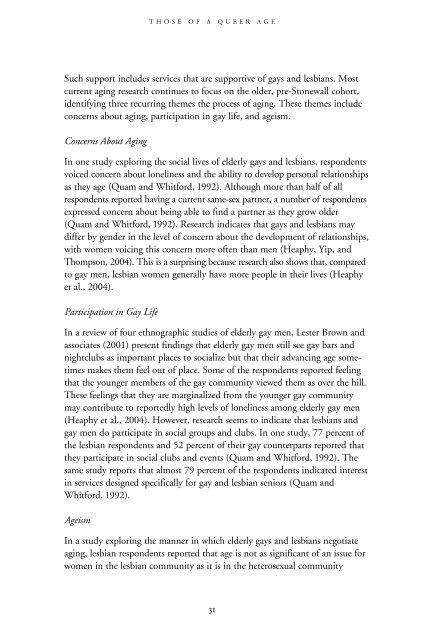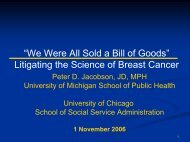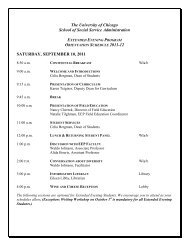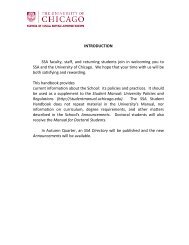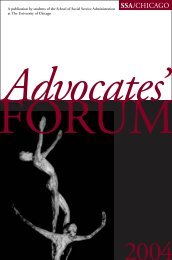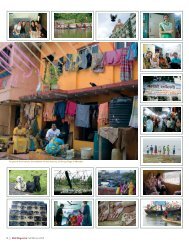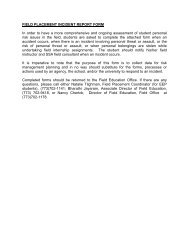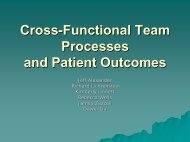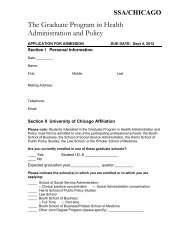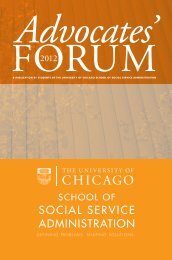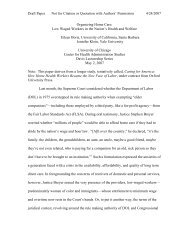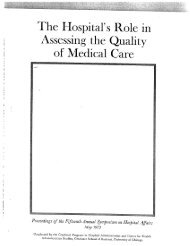2006 - School of Social Service Administration - University of Chicago
2006 - School of Social Service Administration - University of Chicago
2006 - School of Social Service Administration - University of Chicago
You also want an ePaper? Increase the reach of your titles
YUMPU automatically turns print PDFs into web optimized ePapers that Google loves.
THOSE OF A QUEER AGE<br />
Such support includes services that are supportive <strong>of</strong> gays and lesbians. Most<br />
current aging research continues to focus on the older, pre-Stonewall cohort,<br />
identifying three recurring themes the process <strong>of</strong> aging. These themes include<br />
concerns about aging, participation in gay life, and ageism.<br />
Concerns About Aging<br />
In one study exploring the social lives <strong>of</strong> elderly gays and lesbians, respondents<br />
voiced concern about loneliness and the ability to develop personal relationships<br />
as they age (Quam and Whitford, 1992). Although more than half <strong>of</strong> all<br />
respondents reported having a current same-sex partner, a number <strong>of</strong> respondents<br />
expressed concern about being able to find a partner as they grow older<br />
(Quam and Whitford, 1992). Research indicates that gays and lesbians may<br />
differ by gender in the level <strong>of</strong> concern about the development <strong>of</strong> relationships,<br />
with women voicing this concern more <strong>of</strong>ten than men (Heaphy, Yip, and<br />
Thompson, 2004). This is a surprising because research also shows that, compared<br />
to gay men, lesbian women generally have more people in their lives (Heaphy<br />
et al., 2004).<br />
Participation in Gay Life<br />
In a review <strong>of</strong> four ethnographic studies <strong>of</strong> elderly gay men, Lester Brown and<br />
associates (2001) present findings that elderly gay men still see gay bars and<br />
nightclubs as important places to socialize but that their advancing age sometimes<br />
makes them feel out <strong>of</strong> place. Some <strong>of</strong> the respondents reported feeling<br />
that the younger members <strong>of</strong> the gay community viewed them as over the hill.<br />
These feelings that they are marginalized from the younger gay community<br />
may contribute to reportedly high levels <strong>of</strong> loneliness among elderly gay men<br />
(Heaphy et al., 2004). However, research seems to indicate that lesbians and<br />
gay men do participate in social groups and clubs. In one study, 77 percent <strong>of</strong><br />
the lesbian respondents and 52 percent <strong>of</strong> their gay counterparts reported that<br />
they participate in social clubs and events (Quam and Whitford, 1992). The<br />
same study reports that almost 79 percent <strong>of</strong> the respondents indicated interest<br />
in services designed specifically for gay and lesbian seniors (Quam and<br />
Whitford, 1992).<br />
Ageism<br />
In a study exploring the manner in which elderly gays and lesbians negotiate<br />
aging, lesbian respondents reported that age is not as significant <strong>of</strong> an issue for<br />
women in the lesbian community as it is in the heterosexual community<br />
31


